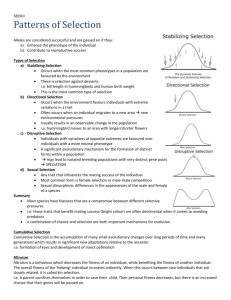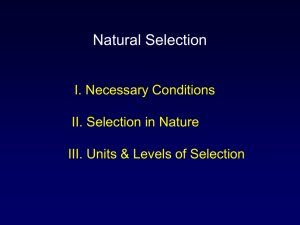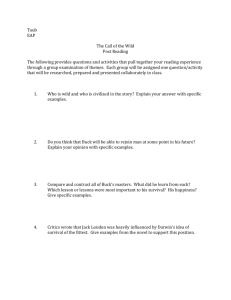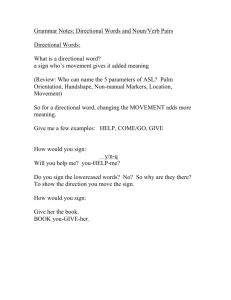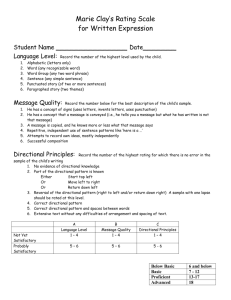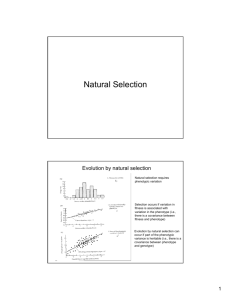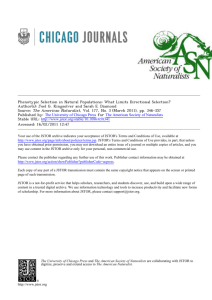Adaptation II. Modes of Selection III. Adaptation “Survival of the
advertisement
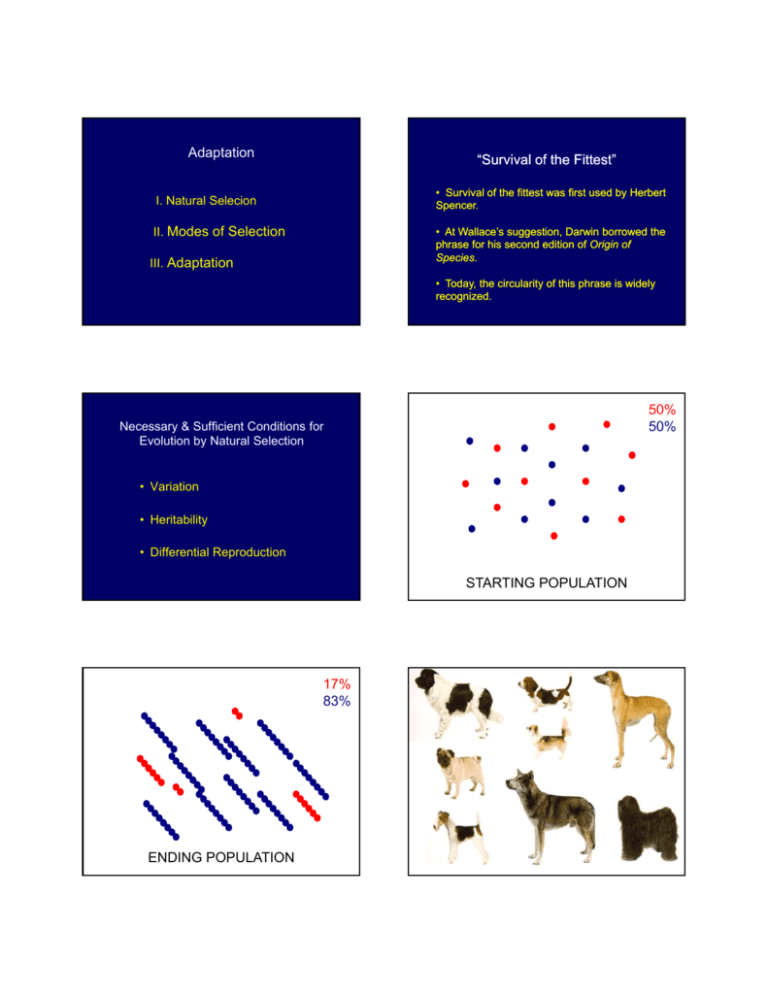
Adaptation “Survival of the Fittest” • Survival of the fittest was first used by Herbert Spencer. I. Natural Selecion II. Modes of Selection • At Wallace’s suggestion, Darwin borrowed the phrase for his second edition of Origin of Species.. Species III. Adaptation • Today, the circularity of this phrase is widely recognized. 50% 50% Necessary & Sufficient Conditions for Evolution by Natural Selection • Variation • Heritability • Differential Reproduction STARTING POPULATION 17% 83% ENDING POPULATION 1 Natural Selection at All Biological Levels ...most authorities now agree that all dogs, from chihuahuas to dobermans are descended from wolves which were tamed in the Near East ten or twelve thousand years ago. • Genes g • Organelles • Cells C. Savage in Wolves • Populations • Communities Mitochondrial Evolution Injection of foreign mtDNA into Host Cell mtDNA Preparing to inject Per cent do onor mtDNA Mitochondria of the donor out out--compete that of the host. Cell Injection Natural Selection in Medicine HIV Pneumococcus Generation Staphylococcus [Source: Niki et al. 1989, Nature 341, 551551-552] 2 HIV inserts its DNA into immune cells. It’s DNA mutates faster than that of any other organism. Natural Selection in Engineering • Variation • Heritability • Differential Reproduction Adrian Thompson University of Sussex Fitness Quantifying Directional Selection y = bx + c Fre equency Fitness Before After Fre equency Fre equency Fitness Modes of Selection on Continuous Characters Trait Trait Trait Directional Selection Stabilizing Selection Disruptive Selection y= x= b= c= Variance Selection [Source: Brodie et al. 1995, Trends in Ecology & Evolution 10, 313 313--318] Empirical Measures of Fitness relative fitness trait value slope (coefficient of directional selection) intercept [Source: Endler 1986, Natural Selection in the Wild, Princeton University Press] Studies Demonstrating Natural Selection in the Wild Direct measure • Number of offspring that survive to reproduce N um be rs of Spe c ies A n im als C o nt. Indirect measures • • • • Growth Survival Mating Success Fecundity [Source: Cooper 1984, Journal of Theoretical Biology 107, 603603-629] P lan ts D is c. 33 4 34 71 4 0 10 14 37 4 44 85 P hysio log ica l 7 0 2 9 8 7 3 18 15 7 5 27 10 10 2 2 Tw o o r M o re To ta l — — Bo th To ta l C o nt. D isc. A ll Sp ec ies C o nt . M o rp ho log ica l Bioc he m ica l D isc. — — Bo th To ta l — — B oth To ta l 12 12 0 8 1 9 4 4 0 8 4 12 1 17 40 12 47 99 16 11 15 42 56 23 62 14 1 [Source: Endler 1986, Natural Selection in the Wild, Wild, Princeton University Press] 3 Frequ uency In most cases, directional selection was not very strong. Directional Selection Coefficient [Source: Kingsolver et al. 2001, The American Naturalist 157, 245245-261] Small beaks cannot crack large, hard seeds. Disruptive Selection in Nature Number Number Probability of survival died survived African Finch Pyrenestes ostrinus Grant 1986 [Source: Smith 1993, Nature 363, 618-620] Summary The Imperfection of Selection • If heritable variation enables some individuals to achieve greater reproductive success than others, evolution must occur. • There is abundant evidence for natural selection of morphological, physiological, and biochemical traits in nature. • The process of natural selection causes the spread of traits that enhance the reproductive success of organisms in their current environment (i.e., adaptation). • Natural selection modifies a preexisting design. • Natural selection produces designs that are successful in the past environment. • Natural selection is not progressive. (e.g., selection has eliminated many organs of parasitic species) 4
